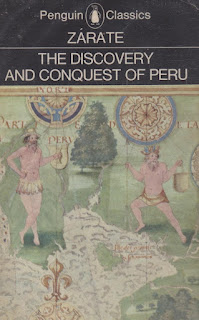
I read 'Creation' the first time a long time back in a public library in the Poconos. It is where I started reading Vidal as well. 'Burr' got me hooked and 'Creation' along with 'Julian' made sure he remains one of my favorite authors of all time.
Gore Vidal is considered a revisionist historical fiction writer. What it means is that he tries to look at history in a different way than the convention dictates. For example, convention dictates that the Greeks stopped the Persian empire in its tracks. Instead, Vidal says given the Persian empire's size and priorities, the Greeks played only a minor part and it is exaggerated by their written historical evidences. That seems fine to me.
But what is really interesting about 'Creation' is that it is not only history (fictionalized to an extent, of course) but it is also a philosophical treatise on the initial thoughts of many philosophies as it exist today. Vidal chooses a time period in history when a lot many of the great minds the world will produce were all alive - including the Buddha, Gosala, Zoroaster, Lao Tzu, Master Kung (a.k.a Confusius), Mahavira, Socrates - and of course a lot of name-dropping happens with the kings and such as well.
What makes it different - also interesting - is the fact that the story is also a discussion of a lot of life philosophies and we come across the early Aryan religion and the stories - as well as a little snippet of Indian history around the succession of Ajatasatru and all. The fact that none of these seem forced or unbelievable is the thing that is good about the book.
The book is history as perceived by the Persians - as it should be. The Achaemenids (preceded by the Assyrians and followed by the Sassanids) built the largest empire on Earth in their day and held it till the Medieval times. The art they inspired remains an inspiration today and the codification of rights in the Cyrus cylinder still is an inspiration for liberty of the people. They left enormous amounts of written records on their daily transactions and ruins that exist from the Near East till the Indus valley. Their history though is barely told anywhere.
Vidal constructs the story from the eyes of Cyrus Spitama - a fictional grandson of the Prophet Zoroaster - and his life in the Achaemenid court of Darius I and Xerxus the great. He also travels from Greece to Cathay (the Known world in the 4th century BC when the story happens) and encounter the various personalities and discuss philosophy and politics with them. Vidal also provides a perspective on the administration as it existed in the Achaemenid empire - the clay tablets of Persepolis and Babylon must've helped richly - building a picture of life in the Persian empire as close to what we can perceive now with the time lapsed between.
How was the universe created? is the central question of the book. Cyrus Spitama narrates and asks the questions to all the celebrities of his day - he goes out to meet with them and discuss and record - so we hear about the rejection of desire by Buddha, the importance of tradition from Confucius and the philosophies of life from everyone from Anaxogores to Lao Tzu. Cyrus records everything and compares against the tenets of his own religion - Zoroastrianism. Thus we get to learn a bit on everything and seek out any that interests.
The writing is cynical, at times bitter and Cyrus, in his assessment of everyone is harsh. Vidal is merciless in his criticism of religions and is full of witty one liners about them. Here is one I liked.
"Hereditary priests usually tend to atheism. They know too much."
However, the book somehow feels to end suddenly. May be the vast canvas that Vidal takes on becomes a little too much and the intertwining of political and philosophical history must've been tiring as well.
Overall, a very good book with a lot of insights and needs multiple reading to fully grasp and understand everything that is said.

No comments:
Post a Comment